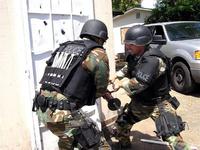-
Facebook could mean the end of undercover ops
Law enforcement officials have begun using Facebook to identify criminals and gather information about their habits, but the technology has the potential to be a double edged sword; an undercover officer could successfully infiltrate a gang only to have their cover blown after their photo is recognized and their Facebook profile carefully scrutinized
-
-
Report finds poor management cause of San Bruno natural gas explosion

An investigation into the cause of a natural gas pipeline explosion that killed eight people and destroyed dozens of homes in San Bruno, California, placed the blame squarely on fifty-four years of bad management by Pacific Gas & Electric Company (PG&E) and the failure of state and federal regulators to notice the problem
-
-
Judge dismisses parts of lawsuit filed by partially naked man at airport
On Tuesday a federal judge dismissed most of the constitutional claims of a lawsuit filed by a man who was arrested at an airport after he stripped at a security checkpoint in protest of enhanced screening measures
-
-
D.C. continues to struggle with orderly evacuations

Last week’s earthquake that struck less than ninety miles outside of Washington, D.C. exposed the city’s continuing difficulties in effectively evacuating its residents; after the 5.9 magnitude earthquake struck the region, commuters were left stranded for hours as road traffic ground to a halt and trains became overcrowded and delayed due to speed restrictions because of the quake
-
-
Expert warns facial biometrics could compromise privacy
As facial biometric technology becomes increasingly ubiquitous, IT experts warn that these systems can easily be abused and therefore require stringent privacy policies and data encryption
-
-
DHS announces 2011 grants, $800 million less than 2010
Last week DHS announced that it would begin distributing more than $2.1 billion in grant money to state and local agencies for fiscal year 2011, nearly $800 million less than last year; the reduction in grant money comes as a reflection of the U.S. government’s attempts to cut spending and find cost savings
-
-
Texas bills government $349 million for illegal immigrants
Earlier this month in a letter to DHS secretary Janet Napolitano, Texas governor Rick Perry blamed the federal government for failing to secure the border and requested $349 million to help cover the costs of detaining illegal immigrants; when she was governor of Arizona, Napolitano would also regularly send the Department of Justice invoices seeking reimbursements for illegal immigration-related expenses by the state of Arizona
-
-
TSA seeks to reduce workforce to cut costs
In an effort to reduce the size of its workforce the Transportation Security Administration (TSA) is seeking to offer early retirements to its employees
-
-
Detecting bioterror attacks
About 80 percent of the U.S. population lives in the thirty largest cities in the United States; the government has deployed a secret system of biosensors to detect bioterror attacks; the location of the sensors, and the pathogens they search for, are kept secret so terrorists would not be able to tamper with the sensors or evade them (officially, even the list of cities where the system is deployed is kept secret)
-
-
San Jose halts gang violence, ends ICE partnership

Two months after it began its alliance with immigration officials to crack down on gang violence, the San Jose Police Department in California announced that it was ending its partnership with the U.S. Immigration and Customs Enforcement (ICE) agency; on 24 June, two ICE agents stepped in to help San Jose which was struggling to contain its highest murder rate in twenty years
-
-
U.S. makes nuclear fuel available to other countries
The United States announced the availability of a reserve stockpile of low-enriched uranium (LEU) for use in nuclear fuel; the LEU is derived from down-blended surplus military material; the LEU will be made available to countries interested in nuclear power generation, thus making it unnecessary for these countries to develop their own uranium-enrichment technology
-
-
North Dakota receives $10 million for border security
To help secure the U.S.— Canada border, North Dakota will receive more than $9.6 million in DHS grants; the funds are aimed at helping local law enforcement agencies prevent a terrorist attack, secure the border, and bolster emergency preparedness
-
-
Obama administration seeks hold on tough Alabama immigration law
The Obama administration has requested a federal judge to temporarily block a tough new immigration law set to take effect in Alabama on 1 September
-
-
Poor oversight, cost overruns plague Coast Guard’s modernization efforts

More than $7 billion and ten years later, the U.S. Coast Guard has only built two ships out of its original twenty-five year, $24.2 billion plan to replace its aging fleet with more than 250 new or upgraded vessels; given the service’s procurement track record, Congress is hesitant to continue funding a program plagued by cost overruns, delays, and management problems
-
-
Chinese TV shows cyber-attack software
A Chinese government TV station, perhaps inadvertently, shows a government cyberattack aimed at Falun Gong computers; the video identifies the software as being written by the Electrical Engineering University of the People’s Liberation Army; the video — which has been removed from the TV station’s Web site — provides direct evidence of Chinese government involvement in cyberattacks
-